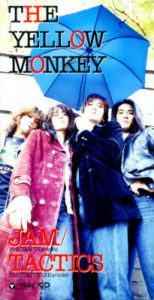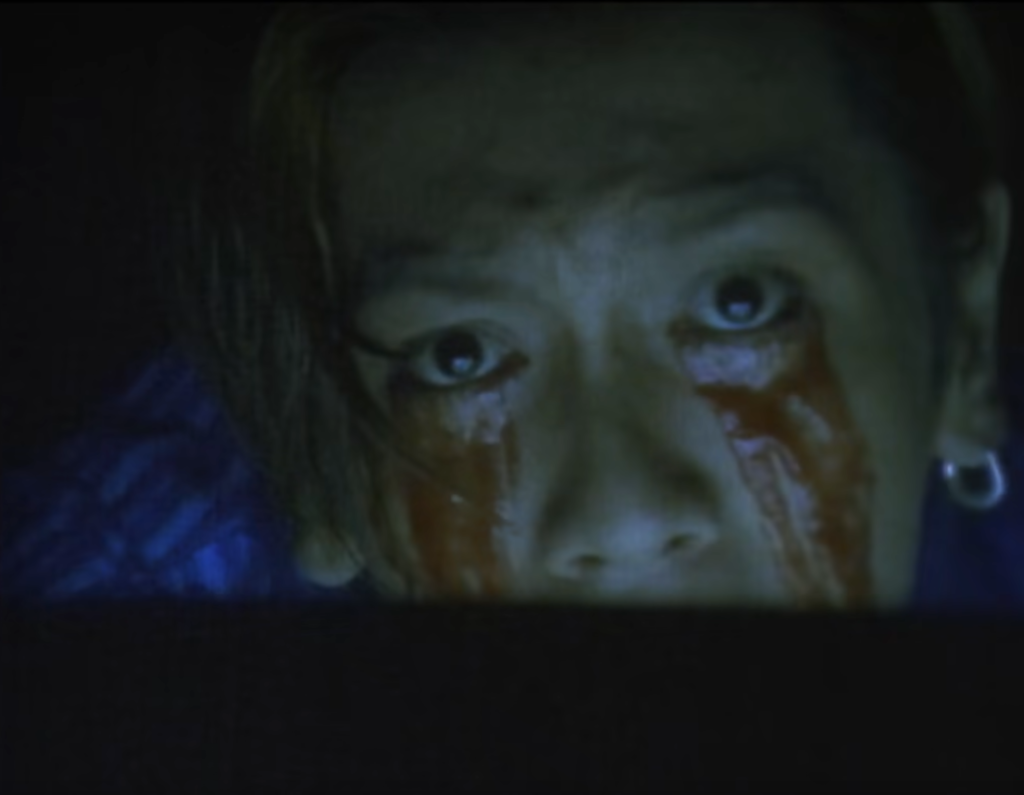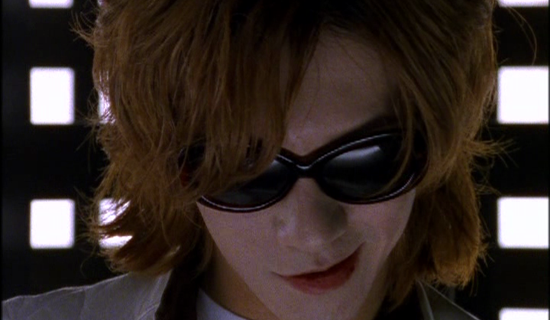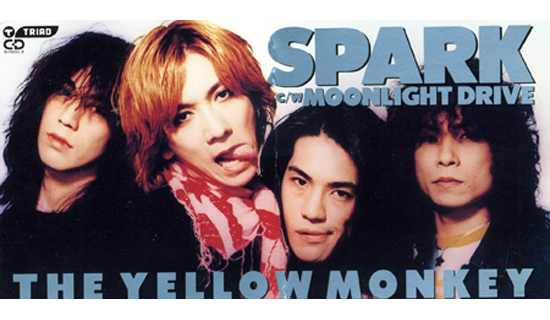
If you’ve read any of my writing about The Yellow Monkey’s albums up until this point, somewhere in there I say “This album made them more popular than before, but their biggest success is yet to come”. Well get ready, because the time for that success is now. And surprisingly it doesn’t even come in the form of a full album, but rather two singles released in 1996: Jam and Spark. They never found their way onto any non-compilation albums, but we’ll get to why that is soon enough.
Four Seasons (released 11/01/1995) was the band’s first album that went to number one, but like it or not, it’s hit singles that give a band real staying power in the public consciousness. Taiyou ga Moeteiru (the single on Four Seasons) had been their most popular one to date, but it just wasn’t quite what was needed to make them a household name. And though the band had said this very same thing about Smile (released 07/21/1995), Four Seasons was an album full of more straightforwardly arranged rock tracks. Though he was putting on his publicity face in interviews and saying this was the direction of the band now, it’s not surprising that Yoshii didn’t stay fulfilled as a song writer for very long in going down this road given that he’s always enjoyed writing songs with some sort of complexity to them.
It’s no secret that one of Yoshii’s biggest influences is David Bowie, and therefore comes as no surprise that he would want to write his own version of one Bowie’s anthems that had the biggest personal impact on him: “All The Young Dudes” (written by Bowie and originally recorded by Mott the Hoople). But British rock wasn’t the only aspect of Yoshii’s musical identity, he’d grown up with and still listened to a ton of enka as well. What if they could both be combined somehow into something that would give The Yellow Monkey a real signature sound? These vague ideas would end up forming themselves into the song Jam.
And this is the “enka” that I was talking about earlier: The versions of Mott the Hoople’s “All The Young Dudes” and Cockney Rebel’s “Tumbling Down” that were inside of me. No, actually it was just me trying to write a Japanese version of a passionate rock ballad…I wondered if I couldn’t write more songs that spoke to younger people, or would inspire courage in people when they heard them. Because that’s exactly what “All The Young Dudes” was to me. I ended up writing this kind of a song even though I liked that kind of journalistic style rock from a more desperate time. I guess that’s the moment I turned into what I am now!
Kazuya Yoshii, interview from So Young (1999)

And not only was it the type of song that Yoshii was really feeling like writing at the time, but he also had begun feeling that the lineup of songs found on Four Seasons, while a good bunch of songs, was a bit disingenuous in terms of representing what the band actually wanted to be:
We’d had success with Smile and Four Seasons, but we didn’t feel that they really represented the core of what the band was. Jam may have been the song that broke through on both fronts, and I felt it was an alluring song that was packed full of all of the band’s different musical influences.
Kazuya Yoshii, In Search of Lost Love (Ushinawareta Ai wo Motomete) (2007)
But the decision of what kind of song to use as your followup single to a very successful album is a critical one, and their record company were very aware of this. When presented with Jam as Yoshii’s idea for the next single, there was almost no support to be had from the people who really mattered in getting it released. They strongly felt that a ballad was not going to be a good followup to keep their audience growing, particularly the band’s manager on Nippon Columbia, Hiroyuki Munekiyo:
“Taiyou ga Moeteiru” sold well, and “Four Seasons” got to number one on the Oricon charts. Not just me, but also Columbia’s marketing and sales departments were expecting another “Taiyou ga Moeteiru” for the next single. Something that was catchy and pop-y, but still a rock song. The media was expecting it as well, and the band had just really begun appearing on TV too. But despite all that, Yoshii wanted the next single to be “Jam”. Of course then I asked him what I was supposed to do with a song like this.
Hiroyuki Munekiyo, Natalie.mu Interview (2013)
But Yoshii and the rest of the band were very adamant that this is the song they wanted to go with, because it was what felt like the right next move to them:
The next single after Taiyou ga Moeteiru should be an upbeat sounding and cool song where when you listen to it, you just think “Ahh, this is so cool! It’s rock!”, right? At least that’s what you’d think in terms of selling, like we were talking about earlier. And if I’d gone with an upbeat song, people would have been like “Ahh, it’s so cool and exciting! They did it, it’s going to be a number one hit!” and we wouldn’t be in this position at all! (Laughs) But ultimately I want The Yellow Monkey to be a band that plays songs that convey real feelings…though that may be a jack of all trades way of thinking about it! (Laughs) And when I think about which one of those will leave a lasting impression and which one will make me feel good in the future, the direction we’re going in with this single is the only real choice. Regardless of whether it succeeds or fails.
Kazuya Yoshii, Ongaku to Hito Interview (1996)
In fact the cover story of the February 1996 issue of Ongaku to Hito featured an interview with Yoshii and boldly called out Nippon Columbia for sitting on the release of Jam after it had already been recorded, no doubt for all of the reasons mentioned above. Of course it was soon after released as a single, and Yemon’s gamble paid off: It was a massive success. It would go on to become one of their biggest and longest selling singles, second only to Burn in terms of overall sales.
And with such a huge hit single, Yoshii finally was able to break himself of a concern that had been haunting him since Smile, the group’s original fan base feeling betrayed by their changes in directions:
The people who have been supporting us from the very beginning sticking with us has been a very important thing for me. After all, they’d been the only support that we had. I was hiding the fact that I had kids and such in order to keep them around, because I just couldn’t let them go…However, I abandoned that idea from Jam onward, realizing that they weren’t actually judging us based on our music. They’re talking about the songs, but not in a way that’s actually evaluating them. It was a matter of differences in taste. Having there be differences in taste is an important thing, but the songs we were recording were not in line with theirs at all. So we completed shifted into taking on an attitude that basically said “Sorry, but we’re going to do things the way we want to do them”.
Kazuya Yoshii, In Search of Lost Love (Ushinawareta Ai wo Motomete) (2007)

The group then followed up with Spark (and Moonlight Drive as the B-side) roughly five months later. This choice was no doubt much more agreeable to their record company, given that it doesn’t pretend to be anything else than an in your face rock song. With so many eyes on the band after Jam, it would have been easy for just the smallest lapse in judgement as to what the next single should be to cost them some popularity. But Spark was just too full of what was maybe the rawest form of the band’s energy that had been recorded up until that point, leading it to become the band’s third best selling single (just beneath Jam and Burn) of all time.
Yemon also started building up new long-term relationships with the recording and release of Spark: The music video was the first in a series of many of the band’s videos that would be directed by Eiki Takahashi. World famous rock photographer (most well known for working with The Rolling Stones) Mikio Ariga also started doing their album cover design, as well as a lot of the band’s promotional photography as well.
With all of the drama around Jam, it should come as no big surprise that the band decided to leave the Nippon Columbia label after the release of Spark:
I think at the time, we were feeling that we wanted to move up to the next level. There’d been so many things we just didn’t see eye-to-eye with our current record company on…We’d decided on changing labels when we were doing the 43 date For Season ~Yasei no Shoumei~ tour, and we’d flipped that switch of wanting to really be able to make music more freely.
Kazuya Yoshii, In Search of Lost Love (Ushinawareta Ai wo Motomete) (2007)
They would end up at Funhouse, a subsidiary of BMG Japan. And though what is arguably their most influential and fondly remembered album is yet to come, there’s no doubt that Jam and Spark are even today two of their most identifiable and well remembered songs. They are in so many ways the very essence of The Yellow Monkey, and absolute proof that all the band ever needed to hit it big was creative freedom…something they got very little of toward the tail end of their time at Nippon Columbia.
